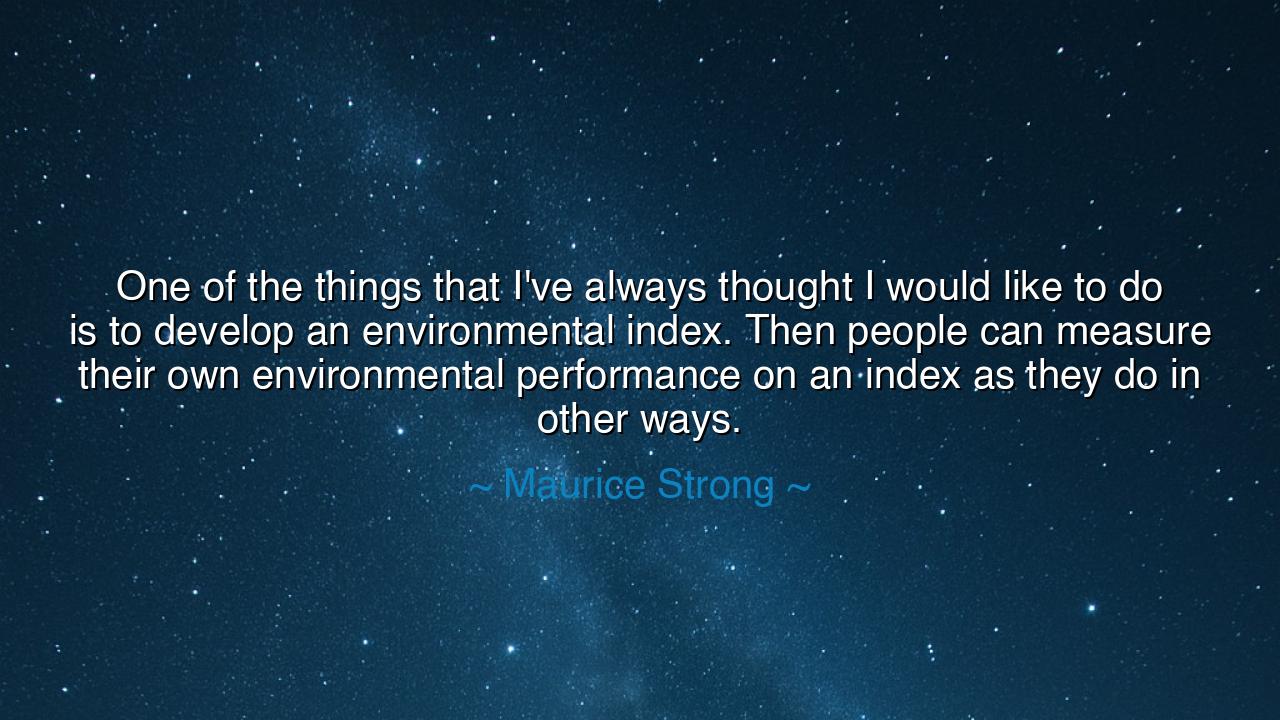
One of the things that I've always thought I would like to do is
One of the things that I've always thought I would like to do is to develop an environmental index. Then people can measure their own environmental performance on an index as they do in other ways.






The words of Maurice Strong, “One of the things that I've always thought I would like to do is to develop an environmental index. Then people can measure their own environmental performance on an index as they do in other ways,” rise with the voice of vision, as though spoken by a prophet who sought to bring order to the chaos of human impact upon the earth. In this phrase, Strong reveals his desire to make the invisible visible, to give humanity a mirror in which to see its own relationship with nature. Just as men measure their wealth in coin, their health in numbers, or their progress in achievements, he dreamed of an index by which the stewardship of the earth could be weighed, judged, and improved.
The origin of this quote lies in Strong’s long career as an architect of global environmental policy. As the secretary-general of the 1972 United Nations Conference on the Human Environment and later a guiding hand behind the 1992 Earth Summit in Rio de Janeiro, he helped awaken the world to the truth that survival itself depends upon sustainability. Yet he understood that lofty speeches and solemn treaties were not enough. Humanity, if it were to change, needed clear instruments—metrics by which people could see their performance and be held accountable. His vision of an environmental index was not mere bureaucracy, but a way to translate values into action, and ideals into measurable progress.
History has shown the power of such measures. Consider the Human Development Index (HDI), created to measure not only the wealth of nations, but their health, education, and overall well-being. Before its creation, progress was often judged only by economic growth, ignoring poverty, literacy, or quality of life. But once the HDI gave the world a yardstick, leaders could no longer hide behind empty wealth. Likewise, Strong’s vision of an environmental index would have exposed the hidden costs of growth, the silent suffering of air, water, and soil. It would have allowed nations and individuals alike to see clearly whether they were healers of the earth or its destroyers.
The deeper meaning of Strong’s words is the call to accountability. For too long, humanity has lived in ignorance, consuming resources without reckoning the cost. Without a measure, the damage seemed distant and diffuse, as though it belonged to no one. But to measure is to awaken. To assign a score is to hold a mirror to the soul. Just as a merchant who tracks his accounts cannot escape debt, so too would an environmental index confront us with the truth of our excesses. Strong’s wisdom was that humanity will not change until it can see its own footprint upon the earth.
Yet there is also a warning here. For to measure is not merely to know, but to act. An index may reveal pollution, deforestation, or waste, but if hearts remain unmoved, the numbers will be nothing but ink on paper. The true power lies not in the measure, but in the resolve that follows. Strong’s vision, therefore, is both practical and moral: a tool to awaken conscience, but also a summons to courage. Once the truth is known, humanity cannot plead ignorance; it must choose whether to change or perish.
The lesson for us is plain. Each of us, in our own lives, must become accountable for our environmental performance. Do not wait for governments or corporations to measure it for you. Look to your own household, your own habits, your own choices. Count the waste you produce, the energy you consume, the water you spend. Strive to reduce, to conserve, to live more lightly upon the earth. For though Strong spoke of nations, the spirit of his words belongs also to individuals. The health of the world is built not only in summits but in homes.
Therefore, let us live as those who measure and those who act. Let us support the creation of instruments that reveal truth, but also cultivate the discipline to heed them. Let us teach our children not only to dream of a cleaner world, but to track their steps upon it, knowing that every choice is a number upon the scale. And let us remember that the greatest index is not written on paper, but in the rivers that run clear, the forests that still stand, the skies that remain blue.
So let Strong’s words endure: “To develop an environmental index… so people can measure their performance.” They are the voice of a seer who sought to turn vision into practice, and practice into transformation. Let them remind us that the earth will not be saved by ignorance, but by knowledge that leads to action, by truth that leads to change, by accountability that leads to renewal. For in the end, the measure of our time upon this earth will not be found in wealth or power, but in the condition of the home we leave behind.






AAdministratorAdministrator
Welcome, honored guests. Please leave a comment, we will respond soon